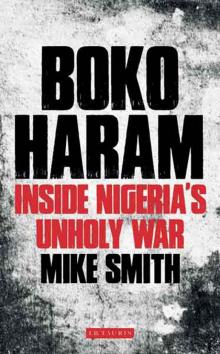- Home
- Mike Smith
Boko Haram Page 2
Boko Haram Read online
Page 2
This was long before the kidnapping of nearly 300 girls from their school in north-eastern Nigeria, an atrocity that would draw the world’s attention to an insurgency that had by then left a trail of destruction and carnage so horrifying that some had questioned whether Nigeria was barrelling toward another civil war. To understand what led to the abductions, it is important to first know what occurred in Kano. To begin to wrap one’s mind around what happened there – bodies lying in the streets and police helpless to stop a rampaging band of young men engaging in suicide bombings and wholesale slaughter – one must first look backward, not only at the formation of Boko Haram itself, but also at the complex history of Nigeria, Islam in West Africa and the deep corruption that has robbed the continent’s biggest oil producer, largest economy and most populous nation of even basic development, keeping the majority of its people agonisingly poor. One must look at colonisation and cultural differences between Nigeria’s north and south, the brutality of its security forces and the effects of oil on its economy. But before all of that, it is perhaps best to begin with a charismatic, baby-faced man named Mohammed Yusuf and an episode two and a half years before the attack in Kano.
In a video from 2009, Yusuf can be seen building his argument, the crowd before him off camera but roaring its approval. He describes a confrontation between security forces and his followers when they were on their way to a funeral, and soon he is lashing out at the soldiers and police, accusing them of shooting members of his sect. It is time to fight back, he says, and to continue fighting until the security task force he believed was set up to track them is withdrawn.
‘It’s better for the whole world to be destroyed than to spill the blood of a single Muslim’, he says. ‘The same way they gunned down our brothers on the way, they will one day come to our gathering and open fire if we allow this to go unchallenged.’1
Yusuf was thought to be 39 at the time and the leader of what had come to be known as Boko Haram. Some had considered him to be a reluctant fighter, content to continue expanding his sect through preaching, but the brutality of the security forces and pressure from his bloodthirsty deputy, Abubakar Shekau, who would later be known as the menacing, bearded man on video threatening to sell kidnapped girls on the market, pushed him toward violence. Not long after the video was recorded, Yusuf would be dead.
His call for his followers to rise up against Nigeria’s corrupt government and security forces would lead them to do just that, beginning with attacks on police stations in the country’s north. Nigeria’s military, not known for its restraint, would soon respond. In July 2009, its armoured vehicles rolled through the streets of the north-eastern city of Maiduguri toward Boko Haram’s mosque and headquarters, soldiers opening fire when they drew within range. What resulted was intense fighting that saw soldiers reduce the complex to shards of concrete, twisted metal and burnt cars spread across the site. Around 800 people died over those five days of violence, most of them Boko Haram members. Security forces claimed Yusuf’s deputy, Shekau, was among those killed, but they would soon be proved wrong. Yusuf himself somehow survived the brutal assault, but was arrested while hiding in a barn and handed over to police. They shot him dead.
Years later, rubble remains at the former site of the mosque. Shekau has repeatedly shown up on YouTube or videos distributed to journalists to denounce the West and Nigeria’s government and Boko Haram, once a Salafist sect based in Nigeria’s north-east, has morphed into something far more deadly and ruthless: a hydra-headed monster further complicated by imitators and criminal gangs who commit violence under the guise of the group. Throughout years of renewed violence, it had been building toward a headline-grabbing assault that would shock the world, and it would do just that in April 2014 with the kidnappings of nearly 300 girls from a school in Chibok, deep in Nigeria’s remote north-east. The abductions and response to them would lay bare for the world to see the viciousness of Boko Haram as well as the dysfunction of Nigeria’s government and military. But for Nigerians, it was yet another atrocity in a long list of them.
Boko Haram had been dormant for more than a year after the 2009 military assault which killed Yusuf, with Shekau, believed to have been shot in the leg, said to have fled, possibly for Chad and Sudan. During that time, authorities in Maiduguri remained deeply suspicious and on the alert for any new uprising. Academics and others in the area with knowledge of the situation predicted a return to violence, saying underlying issues of deep poverty, corruption, a lack of proper education and few jobs left young people with very little hope for the future. Journalists, including myself, visiting Maiduguri one year after the 2009 uprising were made to understand they were not welcome, with secret police trailing our movements. The police commissioner for Borno state, of which Maiduguri is the capital, refused outright to discuss Boko Haram at the time and warned journalists they could be arrested for even uttering those words. Despite such restrictions, I and two other journalists were able to carry out a number of interviews, including with one man who claimed to be a Boko Haram member – a claim to be taken with a heavy dose of scepticism. Looking back now, I have serious doubts about whether he was indeed a Boko Haram follower, particularly since intelligence agents were monitoring us and would have likely questioned him if they suspected him of being one, but certain details of what he told us seemed to ring true in retrospect, whether by coincidence or otherwise.
Through a local contact, we arranged for the man to be brought to our hotel, a hulking building out of sync with its scrubby savannah surroundings. There were few other guests, and the hotel, the Maiduguri International, was badly in disrepair, with mouldy carpets and dirty sheets. Staff, including employees who said they had not been paid in months, refused to turn on the generator for much of the day, leaving the hotel without electricity, since Nigeria was, and remains, unable to produce anywhere near enough power for its burgeoning population. It felt as if we had taken up residence in an abandoned building.
The supposed Boko Haram member, dressed in the same type of caftan any average Maiduguri resident would wear, was led into one of our rooms and took a seat in a chair. I pulled up across from him and began asking him questions, a Nigerian correspondent who works for my news agency translating. The man, who spoke in Hausa, said he was 35 years old, and he claimed Boko Haram members had weapons hidden in various parts of the country with a plan of eventually striking again. Despite my repeated attempts to lead him into explaining in detail why one would willingly join such a violent group, he mostly spoke in generalities.
‘We are ordained by Allah to be prepared and amass weapons in case the enemy attacks’, he said. ‘Anybody who doesn’t like Islam, works against the establishment of an Islamic state, who is against the Prophet, is an enemy.’
At the time, we, like so many others, could see the elements that could spark another uprising, the deeply rooted problems that had led to such hopelessness, and we certainly felt that more violence was possible, if not likely. We would not have to wait long for a more definitive answer. Any sense of normalcy the police commissioner and others hoped to portray would soon be shattered. Boko Haram’s deadliest and most symbolic attacks were yet to come.
* * *
In some ways, unrest seems inevitable in parts of northern Nigeria, a country thrown together by colonialists who combined vastly different cultures, traditions and ethnicities under one nation. This was the case for many African civilisations, but a number of factors would make Nigeria a particularly volatile example, and one must of course start with the oil.
Nigeria first struck oil in commercial quantities in 1956 among the vast and labyrinthine swamps of the Niger Delta in the country’s south. Commercial production began in relatively small amounts at first, but new discoveries would soon come, offshore drilling would eventually take hold and Nigeria would become the biggest oil producer in Africa, gaining astounding amounts of money for its coffers – and a list of profound, even catastrophic, problems to go wit
h it. So much of that money would be stolen and tragically misspent, leading to the entrenchment of what has been called a kleptocracy, assured of its vast oil reserves but with electricity blackouts multiple times per day and poorly paid policemen collecting bribes from drivers at roadblocks, to name two examples among many. Most telling is the fact that it must import most of its fuel despite its oil, with the country unable to build enough refineries or keep the ones it has functioning at capacity to process its crude oil on its own. On top of that, petrol imports are subsidised by the government through a system that has been alleged to be outrageously mismanaged and corrupt. In other words, Nigeria essentially buys back refined oil after selling it in crude form – and at an inflated cost thanks to the middlemen gaming the system.
All the while, Nigeria’s population has been rapidly expanding. It is currently the most populous country in Africa with some 170 million people, including an exploding and restless youth population. It also recently overtook South Africa as the continent’s biggest economy strictly in terms of GDP size, but its population is far larger, meaning the average Nigerian remains much poorer than the average South African. The title of Africa’s biggest economy means little or nothing to most Nigerians, the majority of whom continue to live on less than $1 per day.
It is those Nigerians who are obliged to scrape whatever living they can in whichever way they can find it, while their leaders and corrupt business moguls force their way between traffic in SUVs with police escorts and seal themselves off inside walled complexes. The daily struggle to survive has led to all sorts of outlandish schemes that have, much to the chagrin of hard-working Nigerians, badly damaged the country’s reputation. Emails from Nigerian ‘princes’ promising riches have become so common worldwide that they are now a punchline, but that is only one part of the problem. In Nigeria itself, many residents have taken to painting the words ‘Beware 419: this house is not for sale’ on the outside walls of houses in a bid to keep imposters claiming to be the owners from selling them when no one is there. The number 419 refers to a section of the criminal code, and all such forms of financial trickery have come to be known as 419 scams. Another infamous example involves the police. Newcomers learn quickly that being pulled over by a policeman can be a maddening experience. They have been known to jump into the passenger seat and refuse to exit until they are ‘dashed’, or bribed, even if the driver has done nothing wrong. The almighty dash is central to Nigerian life.
Because the oil has brought riches, there has been little incentive to develop other sectors of the economy. It would be wrong to say that Nigeria’s mostly Christian south, where the oil is located, has done well for itself in these circumstances, but it is certainly true that it has fared better than the north. It is better educated, has more industry and jobs and less poverty. Oil-producing states are handed a significantly bigger chunk of government revenue. Despite that, the region has in no way been immune to violence. The deeply poor Niger Delta, badly polluted by years of oil spills, has seen militants and gangsters take up arms, carry out attacks on the petroleum industry and kidnap foreigners. Some of the worst of this violence occurred under the name the Movement for the Emancipation for the Niger Delta and continued until a 2009 amnesty deal drastically reduced the unrest.
The neglect of other aspects of the economy particularly hit Nigeria’s north, which relies heavily on agriculture, despite northern leaders having run the country for much of its post-independence history. Its culture is vastly different from that of the south, with Islam having migrated along with trade across the Sahara and into the region’s savannah lands around the Middle Ages. Much of present-day northern Nigeria, long ruled by Hausa kings, eventually fell under a caliphate in the early nineteenth century following an armed jihad led by a Fulani Islamic cleric, Usman Dan Fodio. Even today, Dan Fodio remains revered, but it is difficult to locate his reformist legacy in the region, where corrupt elites siphon off revenue at will and a huge population of young people roam with nothing much to do. Boko Haram figures may have occasionally paid lip service to Dan Fodio’s caliphate, but the extremists’ blood-thirsty slaughtering of innocents and lack of any practical plans for how to improve the lives of Nigerians reveal the insurgency to be far different.
As some have pointed out, many in northern Nigeria have come to see democracy as a system that keeps them poor and enriches undeserving, corrupt leaders. In Maiduguri, located near the borders of the neighbouring nations of Niger, Chad and Cameroon, the wealthy take up residence in heavily secured mansions while the poor fetch water from wells, and signs at roundabouts are written in Arabic, proclaiming ‘Allah is the Provider’. It was amidst this atmosphere that Mohammed Yusuf began to lead his followers.
Boko Haram’s re-emergence more than a year after the 2009 uprising and Yusuf’s death began mysteriously, with men on motorcycles and armed with AK-47s carrying out drive-by shootings targeting community leaders and security forces. It was unclear at first whether these killings were indeed being committed by the same group, but whisperings of its return eventually grew louder, and attacks became more deadly. Police stations were once again bombed and burnt, and roadside explosions began to occur regularly. If Nigeria’s southern president was willing to simply ignore it as long as this remained restricted to Nigeria’s remote north-east, he would not be allowed to do so for long. Attacks would eventually spread into other parts of the north, then central Nigeria, then the capital itself.
An attack in June 2011 would signal what was soon to come. A man believed to be a suicide bomber in a car sought to penetrate national police headquarters in the capital Abuja, blowing himself up outside. While the death toll was relatively low, it was considered Boko Haram’s first suicide attack. There would be more.
On the morning of 26 August 2011, a man driving a Honda Accord made his way through the streets of Abuja, his destination the United Nations headquarters for Nigeria. He managed to barrel his way through the exit side of the front gate, guards unable to stop him. He crashed into the front lobby and set off the explosives inside the car, the blast ripping into the building and gutting much of the inside. The attack killed 23 people and wounded dozens more.
It would only get worse, with churches later targeted, including on Christmas Day near the capital, and an office of one of the country’s most prominent newspapers was hit. A British and an Italian hostage were killed in north-western Nigeria by what may or may not have been Ansaru, considered a splinter faction of Boko Haram and which would also be blamed for other kidnappings. Boko Haram members would overrun remote areas of north-eastern Nigeria and raise their own flags, part of the reason the president would eventually decide to declare a state of emergency. Seven members of a French family, including four children, would also be abducted in an incident claimed by Shekau, while dozens of students would be massacred in attacks on schools. Reports began to emerge in 2013 of girls being kidnapped and taken as wives by Boko Haram members. In April 2014, when attackers stormed the town of Chibok and abducted 276 girls from their school, Nigeria’s military seemed to have barely put up a fight.
This has all led to intense speculation over what Boko Haram has become, including from Western nations deeply worried over the spread of what they call terrorism. The group’s re-emergence, and its increasingly violent and sophisticated insurgency, would occur at a time of major change not only in Nigeria, but also among Islamist extremist groups globally. A decade after the 11 September 2001 (9/11) attacks, US President Barack Obama’s administration was claiming to have decimated the core of Al-Qaeda’s leadership, with the help of a campaign of drone strikes. The bulk of those assertions may have been attributed to Obama’s strategy ahead of the 2012 elections, with the president eager to show he had succeeded in his earlier promise of bringing the war in Iraq to a close and refocusing on defeating his country’s main enemy, Al-Qaeda.
Still, political rhetoric aside, there certainly seemed to be important shifts occurring in the landscape of ‘globa
l terrorism’, as it was labelled by the Western world, and there were concerns that unstable African nations could become safe havens for Islamist extremist groups. US military officials in 2011 began warning of signs that the main extremist groups based in Africa – Al-Qaeda in the Islamic Maghreb (AQIM), Al-Shebab in Somalia and Boko Haram – were working toward closer cooperation through arms or financing. There had been evidence of Nigerian Islamists travelling to northern Mali since 2004 for training with extremists from what would later be known as Al-Qaeda in the Islamic Maghreb, but deeper ties remained an open question. Muammar Gaddafi’s fall in Libya in 2011 led to fears that the region’s black market would be flooded with looted weapons from depots in that country. A rebellion in Mali in 2012 that saw Tuareg and Islamist groups take over half of the country prompted further concern and fuelled speculation over whether Boko Haram members had gone there to fight – and what would happen after they returned home. France responded with a military assault to push out the rebels in Mali, and a US drone base was established in Niger with the aim of monitoring the Islamists who were responsible.
The US government has since labelled Boko Haram a ‘global terrorist’ group, but the move has not seemed to have had any major effect, and the debate over whether to designate it as such seemed to again heavily involve American politics. Shekau himself has been put on a US wanted list offering a reward of up to $7 million. After he was named a ‘global terrorist’ by the United States, allowing his assets there to be frozen, he mocked the designation in a video message. ‘I know the United States exists, but I don’t know which part of the world it is located in, whether in the west or the north, the south or the east’, he said in a sarcastic tone, an AK-47 leaning against the wall next to him. ‘I don’t know where it is, not to talk of freezing my assets there.’

 The Sunfire
The Sunfire The Last Praetorian (The Redemption Trilogy)
The Last Praetorian (The Redemption Trilogy) The Mandate of Heaven
The Mandate of Heaven Pax Imperia (The Redemption Trilogy)
Pax Imperia (The Redemption Trilogy) Boko Haram
Boko Haram